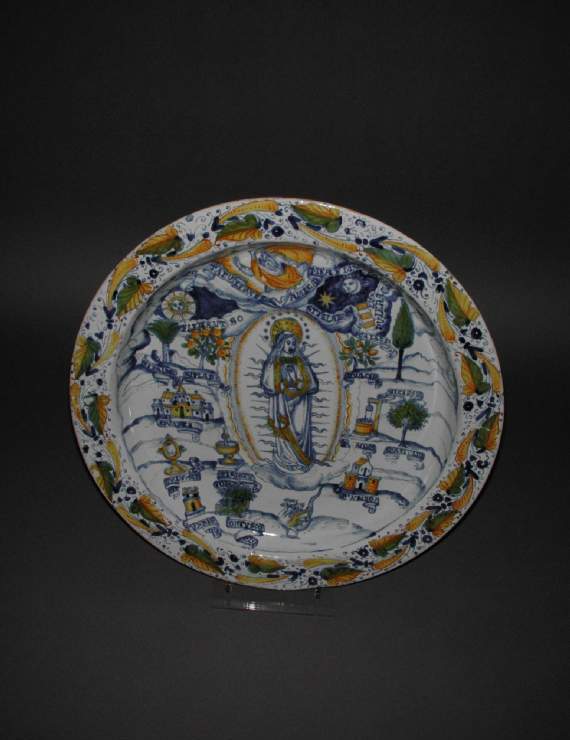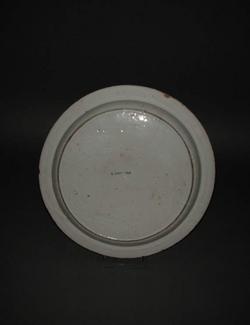Current Location: In storage
Maker(s)
Production:
Unidentified Laterza Pottery
(Possibly)
Production:
Unidentified
(Probably)
Entities
Categories
Description
Maiolica dish, painted in polychrome with, in the middle, the Virgin Mary and, surrounded by, a star, a ladder, a palm, trees, a city, a well, a mirror, a fountain, tower of David, a garden, a temple and a dragon.
Earthenware, tin-glazed overall, unevenly on the back which has many pinholes and a few gritty areas. Painted in blue, yellowish-green, yellow, and orange. Circular with a narrow rim, steep sides, and flat base. (Poole, 1995, Shape approximately 63). In the middle, a mandorla encloses the Virgin Mary standing on a crescent moon and with twelve stars round her head. Above God the Father leans from clouds over a scroll inscribed `TO/TAPU/LERAES/AMICA/MEA IMACU/LA NO/TV PVLER' (Tota pulchra es, amica mea, imacula non tu pulchra), below which on the left is the sun and on the right, the moon. The mandorla is surrounded by symbols labelled on scrolls: a star, STELLA MARI(S) (Star of the Sea); a ladder, SCALACELI (stair to heaven); a palm, QV(A)SI PALMA; an apple or pomegranate tree, QV(A)SI PLARBO (?); a lemon tree, QVACIDRV(M); a cypress QV(A)SI CIPSV (cipressus); a city, CIVADEI (civitas dei); a well, PVAQUA (puteus aquae); an olive, QVASI OLIV(VM); a spotless mirror, SPE/CVLV SINCVL (speculum sine culpa); a sealed fountain, FONS/SIGNATVS; a tower of David, TVRRISDAV(ID); an enclosed garden, ORTVSCO CLV (hortus conclusus), a temple of the lord, TE(M)PLVMDO(MINI); and a dragon with seven heads, unlabelled. The rim is decorated with parti-coloured yellow and green leaves, carrot-shaped motifs and blue stems, tendrils and spots.
Notes
History note: Sydney Hand, Grafton Street, London, from whom purchased for £20 on 28 April 1919 by Dr J.W.L. Glaisher, FRS, Trinity College, Cambridge
Legal notes
Dr J.W.L. Glaisher Bequest
Measurements and weight
Diameter: 45.2 cm
Height: 4.5 cm
Acquisition and important dates
Method of acquisition: Bequeathed
(1928-12-07)
by
Glaisher, J. W. L., Dr
Dating
17th Century
Circa
1625
CE
-
1675
CE
Note
This dish was attributed to Seville when Glaisher purchased it, was reattributed to Laterza on the basis of its extremely white glaze, colouring and border pattern. More recently archaeological finds suggest that the border of carrot-like motifs, flowers and leaves, was used by potteries in several different towns, such as Nardò, in the area known as the Salento or Terra di Otranto.
People, subjects and objects depicted
Components of the work
Decoration
composed of
high-temperature colours
( blue, yellowish-green, yellow, and orange)
Materials used in production
Tin-glaze
Earthenware
Techniques used in production
Tin-glazing
: Earthenware, tin-glazed overall, unevenly on the back which has many pinholes and a few gritty areas. Painted in blue, yellowish-green, yellow, and orange.
Inscription or legends present
Inscription present: Tota pulchra es, amica mea, imacula non tu pulchra
- Text: TO/TAPU/LERAES/AMICA/MEA IMACU/LA NO/TV PVLER
- Location: On front
- Type: Inscription
- Text: 'STELLA MARI', 'SCALACELI ', 'QVSI PALMA', 'QVSI PLARBO', 'QVACIDRV', 'SPE/CVLV SINCVL', 'FONS/SIGNATVS', 'TVRRISDAV', 'ORTVSCO CLV', 'TEPLVMDO'
- Location: On front
- Type: Inscription
References and bibliographic entries
Related exhibitions
Identification numbers
Accession number: C.2117-1928
Primary reference Number: 73125
Old object number: 4851
Stable URI
Audit data
Created: Saturday 6 August 2011
Updated: Tuesday 20 August 2024
Last processed: Tuesday 15 July 2025
Associated departments & institutions
Owner or interested party:
The Fitzwilliam Museum
Associated department:
Applied Arts





